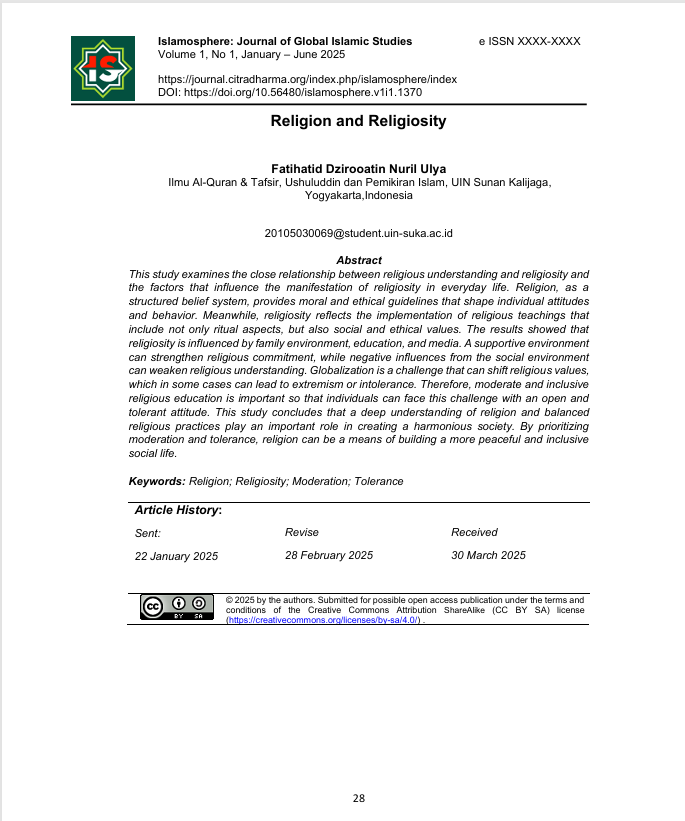Religion and Religiosity
 Abstrak View:
Abstrak View:
20
 PDF downloads:
PDF downloads:
17
Kata Kunci:
Religion, Religiosity, Moderation, ToleranceAbstrak
This study examines the close relationship between religious understanding and religiosity and the factors that influence the manifestation of religiosity in everyday life. Religion, as a structured belief system, provides moral and ethical guidelines that shape individual attitudes and behavior. Meanwhile, religiosity reflects the implementation of religious teachings that include not only ritual aspects, but also social and ethical values. The results showed that religiosity is influenced by family environment, education, and media. A supportive environment can strengthen religious commitment, while negative influences from the social environment can weaken religious understanding. Globalization is a challenge that can shift religious values, which in some cases can lead to extremism or intolerance. Therefore, moderate and inclusive religious education is important so that individuals can face this challenge with an open and tolerant attitude. This study concludes that a deep understanding of religion and balanced religious practices play an important role in creating a harmonious society. By prioritizing moderation and tolerance, religion can be a means of building a more peaceful and inclusive social life.
Referensi
Aminuddin. (2016). Media DakwAH. Al-Munzir, 9(1), 344–363. http://scioteca.caf.com/bitstream/handle/123456789/1091/RED2017-Eng-8ene.pdf?sequence=12&isAllowed=y%0Ahttp://dx.doi.org/10.1016/j.regsciurbeco.2008.06.005%0Ahttps://www.researchgate.net/publication/305320484_SISTEM_PEMBETUNGAN_TERPUSAT_STRATEGI_MELESTARI
Araniri, N. (2020). Peran Guru Pendidikan Agama Islam Dalam Menanamkan Sikap Keberagamaan Yang Toleran. Risâlah, Jurnal Pendidikan Dan Studi Islam, 6(1), 54–65.
https://doi.org/10.31943/jurnal_risalah.v6i1.122
Azman, Z. (2022). Dakwah Bagi Generasi Milenial Melalui Media Sosial. Jurnal Khabar: Komunikasi Dan Penyiaran Islam, 3(2), 193–205. https://doi.org/10.37092/khabar.v3i2.350
Boty, M. (2015). Agama Dan Perubahan Sosial (Tinjauan Perspektif Sosiologi Agama). Jurnal Istinbath, Vol. XIV, 41.
https://jurnal.radenfatah.ac.id
Casram, C. (2016). Membangun Sikap Toleransi Beragama dalam Masyarakat Plural. Wawasan: Jurnal Ilmiah Agama Dan Sosial Budaya, 1(2), 187–198. https://doi.org/10.15575/jw.v1i2.588
Durkheim, E. (1995). The Elementary Forms of Religious Life.
Fahri, mohammad, A. zainuri. (2022). Moderasi Beragama di Indonesia. Religions, 13(5), 451. http://jurnal.radenfatah.ac.id/index.php/intizar/article/download/5640/3010/
Fuad, N. (2010). Pendidikan Berbasis Masyarakat: Studi Kasus di Pondok Pesantren Al-Ittifaq Bandung. Jurnal Penelitian Pendidikan Agama Dan Keagamaan.
https://doi.org/10.32729/edukasi.v8i3.99
Haris, M. (2017). Agama dan Keberagamaan: Sebuah Klarifikasi untuk Empati. Tasamuh: Jurnal Studi Islam, 9(2), 523–544.
https://aladalah.uinkhas.ac.id/index.php/aladalah/article/view/183/148
Hasni, F., & Kambali. (2022). STUDI ISLAM DALAM PENDEKATAN SOSIOLOGI. Jurnal Sosial Dan Sains, 2(2), 278–285. doi: https://doi.org/10.59188/jurnalsosains.v3i6.816
Iryana, & Kawasati, R. (2020). Teknik Pengumpulan Data Metode Kualitatif. Ekonomi Syariah Sekolah Tinggi Agama Islam Negeri (STAIN) Sorong, 1(1). https://www.unhcr.org/publications/manuals/4d9352319/unhcr-protection-training-manual-european-border-entry-officials-2-legal.html?query=excom 1989
Kurniasih, I., Rohmatulloh, R., & Al Ayyubi, I. I. (2023). Urgensi Toleransi Beragama di Indonesia. Jazirah: Jurnal Peradaban Dan Kebudayaan, 3(1), 185–193. https://doi.org/10.51190/jazirah.v3i1.62
Manshur, M. (2017). Agama dan Pengalaman Keberagamaan. Madinah: Jurnal Studi Islam, 4(2), 133–143.
https://doi.org/10.58518/madinah.v4i2.195
Miles, M. B., Huberman, A. M., & Saldana, J. (2015). Qualitative Data Analysis: A Methods Sourcebook (3rd ed.). Sage. https://ia803100.us.archive.org/0/items/spradleyanalisisdatakualitatifmodeletnografi/Matthew_Miles%2C_Michael_Hberman%2C_Johnny_Sdana-Qualitative_Data_Analysis__A_Methods_Sourcebook-Sage_%282014%29%5B1%5D.pdf
Octaviana, D. R., & Ramadhani, R. A. (2021). HAKIKAT MANUSIA: Pengetahuan (Knowladge), Ilmu Pengetahuan (Sains), Filsafat Dan Agama Dila. Jurnal Tawadhu, 2(2), 143–159.
https://doi.org/10.52802/twd.v5i2.227
Potutu, B. S., & Djafri, N. (2023). Perspektif Agama Islam Dalam Membangun Sikap Toleransi Masyarakat Beragama. Academia, 1–7. https://d1wqtxts1xzle7.cloudfront.net/109250072/Artikel_PAI_Bayu_S._Potutu_431423015_-libre.pdf?1703005929=&response-content-disposition=inline%3B+filename%3DPerspektif_Agama_Islam_Dalam_Membangun_S.pdf&Expires=1743181061&Signature=buf5OWzbEGo1yLjEkx6JHjz
Rahman, F. (1982). Islam & Modernity: Transformation of an Intellectual Tradition. The University of Chicago Press, Chicago 60637. https://ia903207.us.archive.org/2/items/FazlurRahmanIslamandModernity/FazlurRahmanIslamandModernity.pdf
Sahdin, S. (2020). Dialog Agama-Agama: Mendewasakan Keberagamaan Dalam Masyarakat Majemuk. An Nadwah, 25(2), 170. https://doi.org/10.37064/nadwah.v25i2.7495
Sugiyono. (2013). Metode Penelitian Kuantitatif, Kualitatif, dan R&D (19th ed.). Alfabeta.
https://digilib.unigres.ac.id/?p=show_detail&id=43
Susanto, E. (2014). Spiritualisasi Pendidikan Agama Islam : Nuansa, 11, 316–340. http://ejournal.iainmadura.ac.id/index.php/nuansa/article/view/536%0Ahttp://ejournal.iainmadura.ac.id/index.php/nuansa/article/download/536/519
Waris, et. al. (2022). Metodologi Penelitian Kualitatif. In Metodologi Penelitian Kualitatif. In Rake Sarasin (Issue Maret).

Unduhan
Diterbitkan
Cara Mengutip
Terbitan
Bagian
Lisensi
Hak Cipta (c) 2025 Fatihatid Dziroaatin Nuril Ulya

Artikel ini berlisensiCreative Commons Attribution-ShareAlike 4.0 International License.
Copyright Notice
Authors who publish with this journal agree to the following terms:
- Authors retain copyright and grant the journal right of first publication with the work simultaneously licensed under a Creative Commons Attribution-ShareAlike 4.0 International License that allows others to share the work with an acknowledgment of the work's authorship and initial publication in this journal.
- Authors are able to enter into separate, additional contractual arrangements for the non-exclusive distribution of the journal's published version of the work (e.g., post it to an institutional repository or publish it in a book), with an acknowledgment of its initial publication in this journal.
- Authors are permitted and encouraged to post their work online (e.g., in institutional repositories or on their website) prior to and during the submission process, as it can lead to productive exchanges, as well as earlier and greater citation of published work (See The Effect of Open Access).

This work is licensed under a Creative Commons Attribution-ShareAlike 4.0 International License.




